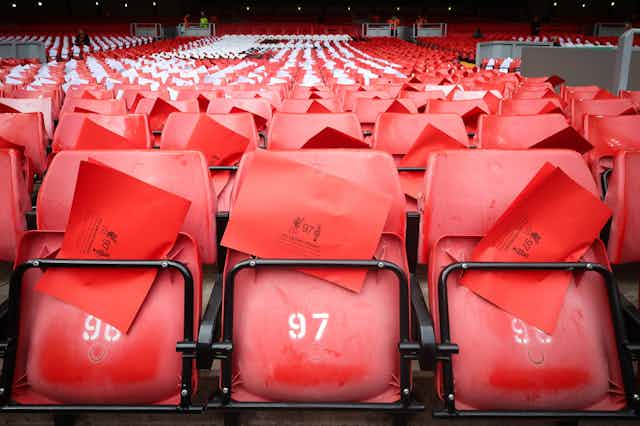
In his first conference speech as prime minister, Keir Starmer promised that a Hillsborough law will be implemented in April, before the next anniversary of the football stadium disaster. The bill will require public agencies to help with investigations into potential disasters and scandals.
This statement comes after a lengthy struggle by the families of the 97 persons died (and hundreds more injured) when a portion of Hillsborough Stadium collapsed in 1989.
The catastrophe and the subsequent probe demonstrated how powerful people frequently obstruct justice by concealing information or refusing to help in investigations.
Initial media coverage of the Hillsborough disaster incorrectly blamed football fans for the deaths. A public inquiry found flaws in police control, although its primary recommendations focused on crowd safety in sports arenas.
Crucially, the committee did not have access to all relevant information, interviewing only a few of individuals involved in an effort to prepare a narrowly focused report. An inquest determined that the deaths were “accidental”.
Families of deceased individuals “were sure that the true context, circumstances and aftermath of Hillsborough had not been adequately explored, established and made public” . Additional initiatives and struggles for truth and justice followed. Families attempted to file private prosecutions against two of the police officers in charge of operations at the event. Neither were successful.
charged. In 2009, the government waived the regular 30-year ban on the publishing of official papers to ensure that all disaster-related documents were available to investigators.
Shortly after, the government established the Hillsborough Independent Panel to investigate the disaster’s causes with full access to relevant evidence and close contact with Hillsborough relatives. The panel’s assessment focused on policing shortcomings and concluded that crowd safety had been “compromised at every level” owing to “well known” flaws. The study concluded that police “sought to deflect responsibility” on Liverpool fans.
New inquests concluded that the deaths of 97 had been unlawful, highlighting police and emergency service failures and exonerating the supporters who were initially blamed.
In 2012, South Yorkshire Police apologized and acknowledged the independent panel’s findings that “senior officers sought to change the record of events” in the aftermath.
Decades of campaigns
The protracted struggle for truth and justice has been characterized by a lack of honesty and openness by those in authority, a desire to close ranks and blame others, and a failure to share essential information. A Hillsborough law will impose “a positive duty to tell the truth” and require public authorities to “proactively assist investigations”.
Starmer confirmed in his speech that the law will include criminal sanctions for those who breach it. Proposals also include better legal support and representations for future victims of disasters and their families.
Proposals for a Hillsborough law were first put forward in 2017 as a private members’ bill by Andy Burnham, then shadow home secretary. Its passage was interrupted by the 2017 general election, but some aspects were reintroduced in 2022 in another private member’s bill. This, too, was interrupted when Boris Johnson prorogued parliament. Since becoming Labour leader, Starmer has framed his project as being one committed to returning his party, and the government, back to the service of working people. Passing a law designed and advocated for by working-class people who experienced injustice when their family members died is a clear symbol of this agenda.
The law is also indicative of Starmer’s efforts to frame his government as one that seeks to be transparent, open and consistent. This puts him in contrast to the preceding 14 years of Conservative rule, which were marred by allegations of corruption and misconduct.
High-profile scandals related to the pandemic, including members of the government holding illegal parties in Downing Street and misallocated contracts for PPE (personal protective equipment) to companies owned by people closely connected to government are just two examples.
The announcement comes as Starmer himself, and senior members of his government, have been accused of lack of transparency on donations and gifts. Announcing the Hillsborough law goes some way to repairing his commitment to transparency and service in government, which has lost some of its shine in recent weeks.
Changing the culture
The reaction to the announcement from families and campaigners has been positive.
The director of the charity Inquest, which aids families of people who have died in state-related tragedies, described the measure as “a step forward in providing a legacy for the 97 so that others do not have to go through the pain and trauma of decades of campaigning”.
The potential impact of the law extends far beyond Hillsborough. Other recent occurrences, such as the Post Office scam, tainted blood, and the Grenfell Tower catastrophe, have all been influenced by persons in positions of power’s lack of transparency and candour.
But will a legislation on its own be sufficient? From Hillsborough to Grenfell to Windrush, these numerous atrocities demonstrate that the issue of secrecy and a lack of transparency and candour is systematic and cultural. The
The British state has historically been characterized by elitism, a government-knows-best attitude, and skepticism toward citizen engagement, participation, and openness.
While the Hillsborough law is a step forward, it is simply one piece of the puzzle in making British governance more transparent and democratic.

Leave a Reply